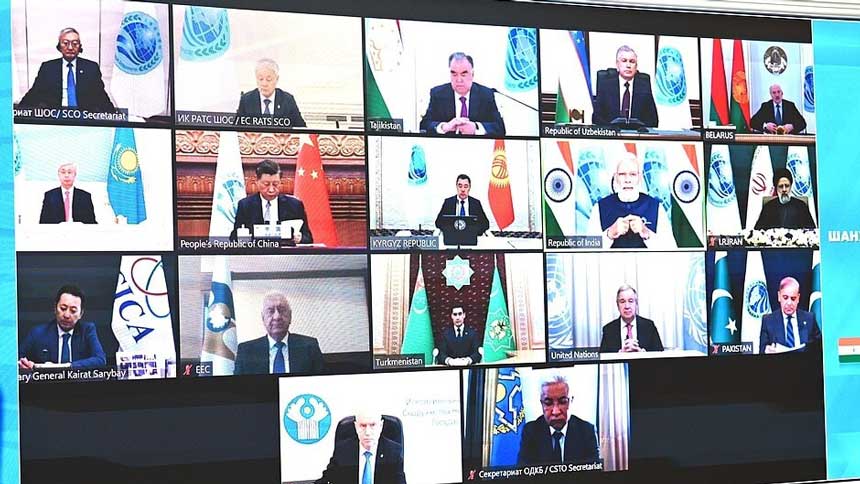Title: Shanghai Cooperation Organization Summit Shrinks as India Downgrades Event
Date: July 5, 2023
The annual meeting of the Council of Heads of State of the Shanghai Cooperation Organization (SCO) was held via video conference on July 4th, with India as the host country. However, the event witnessed a noticeable reduction in scale, fueling speculation about India’s intentions to downgrade the SCO summit. Despite the issuance of the “New Delhi Declaration,” it became apparent that the participating countries, particularly China and Russia, were primarily focused on pursuing their individual interests rather than fostering true unity within the organization.
Indian Prime Minister Narendra Modi presided over the virtual gathering, which was attended by leaders from China, Russia, Kazakhstan, Uzbekistan, Kyrgyzstan, Tajikistan, and Pakistan. Observer countries such as Belarus, Iran, and Mongolia also participated. The decision to hold the summit online was met with criticism, particularly from China, which expressed its dissatisfaction over India’s refusal to hold a face-to-face meeting. Chinese state media even hinted that India was giving the SCO a cold shoulder.
According to Yang Wei, a current commentator, India’s reluctance to provide a platform for close interaction between Chinese Communist Party (CCP) leaders and other world leaders might be indicative of strengthening US-India relations. India’s priorities appear to lie in deepening cooperation with the United States, demonstrated by Prime Minister Modi’s recent visit to the US and subsequent return. This shift in focus may have limited India’s desire to fully engage with other SCO members.
The “New Delhi Declaration” signed at the summit made vague references to cooperation and global issues while emphasizing a lack of targeting towards other countries and international organizations. However, many observers interpreted the document as containing implicit criticism of the CCP. References to “mutual respect for sovereignty” and condemnation of Pakistan as a harborer of terrorist organizations were seen as veiled criticisms of China’s territorial ambitions and Pakistan’s alleged involvement in supporting terrorist networks.
Notably, the declaration highlighted support for China’s “Belt and Road” initiative from countries such as Kazakhstan, Kyrgyzstan, Pakistan, and Russia, while omitting India from the list. This exclusion suggests that India does not back China’s ambitious infrastructure project.
The summit also showcased the internal concerns of both China and Russia. Xi Jinping, in his video speech, denounced protectionism, unilateral sanctions, and decoupling efforts, clearly taking aim at the United States and its allies. Meanwhile, Putin aimed to quell unrest within the SCO by asserting the unity and stability of Russia, emphasizing his continued control amidst reports of armed rebellion.
The summit also exposed a dispute between the use of the yuan and the ruble in transactions between Russia and Central Asian countries and India. The Kremlin’s desire to maintain regional hegemony and limit the influence of the CCP was evident through its promotion of ruble transactions and refusal to allow the insertion of the Chinese currency.
Yang Wei interpreted these events as signs of the CCP’s isolation and exclusion from international affairs. With the United States and its allies tightening the noose around China and Russia grappling with their own challenges, it seems increasingly difficult for the Shanghai Cooperation Organization to expand its regional influence and build counterbalancing alliances against the West.
Overall, the recent SCO summit highlighted India’s willingness to weaken the organization’s influence, China and Russia’s pursuit of self-interest, and the challenges faced by all parties in finding unity amidst growing geopolitical tensions.
This article was edited and produced by Voice of Hope. Please credit Voice of Hope and include the original title and link when reprinting.
